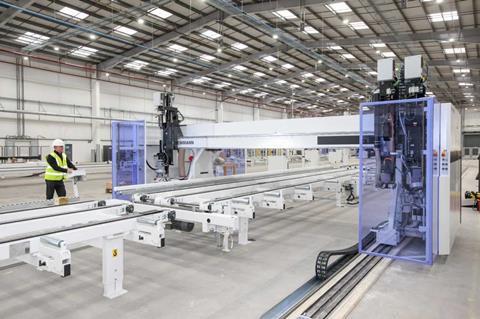New owner says firm’s three factories have not been performing as well as they should have
The boss of Vistry’s partnerships business – which will be re-branded as Countryside Partnerships following Friday’s £1.1bn takeover – has said the merger is likely to see Vistry reverse Countryside’s decision to mothball and sell its brand new modular housing factory, in order to produce homes for the combined group.
Friday’s takeover of Countryside Partnerships by Vistry for £300m in cash and more than 128 million Vistry shares has created a housebuilding and partnerships housing giant boasting a pro-forma 2021 turnover of £4bn from more than 14,000 housing completions – making the firm virtually equal in scale to Taylor Wimpey and Persimmon.
Stephen Teagle told Building’s sister title Housing Today that Vistry’s would look to keep Countryside’s brand new £20m timber frame modular housing factory in Bardon in the East Midlands, rather than sell it off, as Countryside had previously proposed.

In July, it said it would quit the modular business, which lost £3m in the first six month of the financial year, putting the Bardon plant up for sale the following month.
But Teagle said Countryside’s three manufacturing facilities, including the Bardon plant, were “strategic assets” that Vistry intended to keep.
He added: “We’re reviewing it. They have three factories across the country that are below capacity. They are not delivering the homes that the factories have the capacity to deliver, and what we would like to do is invest in those factories, with our partners to allow us to deliver more homes that are based on MMC.
“And again, that broadens our supply chain, which again, delivers more homes, because you’re not just relying upon building traditional brick homes. There’s a clear opportunity to align the investment plans of our partners with that production capacity given the scale we will have.
“We are undertaking a thorough review [but] that’s our intention to utilize those factories to allow us to deliver even more homes.”
The wider deal is particularly significant for Vistry’s partnerships business, combining Countryside’s 4,400 homes-a-year partnerships business with Vistry’s smaller 2,000 homes-a-year operation to form the biggest partnerships housing firm in the UK, with pro-forma 2021 revenue of £1.9bn.
Partnerships housing businesses build homes under a variety of different business models for clients including housing associations, local authorities and build to rent developers.
Vistry had already set out plans to grow its partnerships business to 5,000 homes a year at a compound rate of 12% annual growth. Teagle said the combination would allow the business bring forward its plans for growth by seven years, and keep expanding beyond that. Countryside has set out similar plans for between 10%-15% annual profit growth from its business.
Teagle said: “We expect the delivering as a business to be well in excess of 15,000 homes a year. So, when you look forward to what our capacity is as a business, we’re going to be a very significant provider of new homes.
“By aligning and combining the two businesses, it accelerates [our growth] plan, which allows us to deliver more homes more quickly. This merger does not dilute our output. Quite the opposite. We’re amplifying it by using the strategic assets we’ve got, the people and the manufacturing base, and the supply chain relationships and the relationships with housing providers to deliver even more.
“And I think that’s an important point to be seen from the perspective of anybody who’s interested in increasing the amount of delivery in the UK.”

It is understood the combined partnerships business will now continue to target annual compound growth of around 12%, with Vistry on Friday declaring a medium-term turnover target for the business of £3bn.
He said the cash cost of the Countryside buyout, at £300m, was “modest” given the scale of the combined business and would not impact upon Vistry’s ability to invest in growth.
Teagle described the combined Vistry business as a “21st century housing business model, which is that ability to work across tenures and work with partners on long term planning for supply”, adding the merger had so far received unanimous support in conversations with clients.
Vistry group chief executive Greg Fitzgerald (pictured, right), who has promised to deliver £50m of “synergy” savings from the deal, said in a statement that it was a “historic” day for Vistry.
He said: “With our resilient business model of sustainable private and affordable delivery, we stand ready to build thousands of new homes, which is obviously great news for home hunters but also for our clients, contractors and local communities, where we will be bringing a much-needed economic boost.
“In developing this unique, enlarged group we are bringing together the very best of both businesses. We will integrate the two groups quickly, and in line with our values of integrity, caring and quality, bringing together our talented people to power us to further success.”


























No comments yet